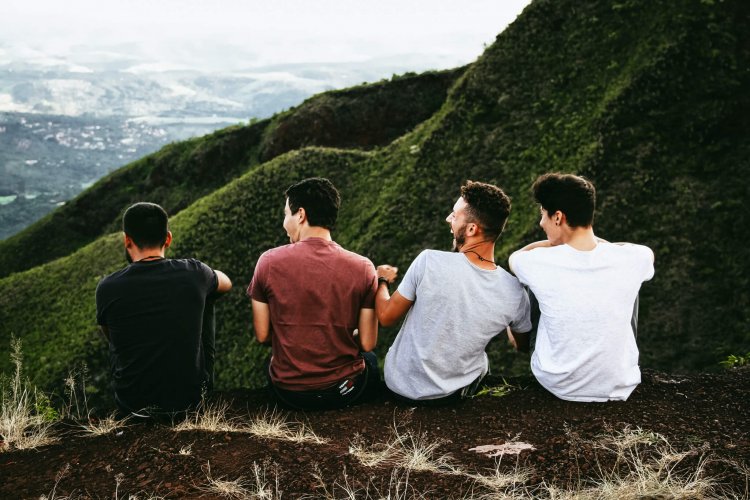This International Men’s Day, Let Us Look at Global Issues Faced by Men

Femininity versus masculinity is often a highly debated issue in society today, especially in the first world, where men and women are seen as different and are expected to be doing different things. While women still have a long way to come when it comes to being treated equally in life, the workplace, and everywhere in between, men also suffer in society. The Good Men Project lists few of such challenges that men face on a global scale;
Combatting Racism, Sexism, Homophobia
All of these seemingly different social issues stem from society’s views of masculinity. Racism comes directly from men being told their role is to “provide and protect”. Most of systemic racism comes white supremacists seeking to gain economic advantage. A man is not a man unless he is a financial success (so the old stereotype goes). And racism has long been used as a way to leverage financial success for a small group of people at the top. Sexism comes directly from the idea that women are “less than” men. It’s part economics, part control, part access to sex. Homophobia is a way of marginalizing other men- as well as cutting men off from platonic touch (“No homo”) and emotional intelligence.
Relationships of Every Kind
When people think of men and relationships, the first thing that often comes to mind is sexual relationships. But the truth is, men are just as interested in and committed to a host of other kinds of relationships. Male friendships, fathers and their sons and daughter, sons and their fathers and mothers. Familial relationships of all kinds. Long term committed relationships between loving partners. Platonic friendships. Work relationships. Online relationships. Meeting new people. Friendships between gay and straight men that go beyond stereotypes. Men loving their children with their whole heart and soul, and making conscious decisions to love differently than their own parents. ALL of those relationships are part of the psyche of today’s man, and all are relationships that should be celebrated by our society and culture.
The Disposability of Men & Boys
Men have historically been the first to war, the first into a burning building, the last to exit a sinking ship. Men are seen as the champions of economic progress and the ones who are there to put into place the infrastructure that drives our transportation and communication systems. But there are hidden costs - every year thousands of men die in the coal mines, railroads, sewers, satellite towers and other dangerous workplaces that are too often taken for granted. From the invisibility of boys who are being sex trafficked to men who are being exploited as cheap manual labour, there is something in our collective consciousness that treats men and boys as disposable.
Parenting, Stay-At-Home Dads and Paternity Leave
While times are changing and stereotypes along with them, there are many places where moms are still seen as the default parent, the one who is more “natural” at the act of parenting and caring for children. Dads are clearly present in the lives of their children, but Stay-At-Home-Dads are (still) all too often seen as slackers or losers when nothing could be further from the truth. They are there for their children because they want to be a part of their children’s lives. And yet, men are not supported in learning about their roles of becoming a father in the same way that women are taught about becoming mothers.
Men also find enormous difficulties when it comes to divorce and custody. The role of active, engaged fathers should be coveted. That is not going to happen if men are only seen as financial providers who are incapable of nurturing.
Men and the Pressure of Financial Success
The pressures to be a financial success lead some men to abuse the system. And others to feel like a failure, for not being able to live up to society’s expectation of them. All of this is made even more difficult by a world that is changing even faster than most of us can keep up with it. There are fewer career jobs that have built-in security and that you can retire from with a pension. Robots, technology and automation really does mean there are fewer jobs out there. For a high percentage of families, a $1,000 unexpected expense would be catastrophic.
Domestic Violence on Men
More than 830,000 men fall victim to domestic violence every year, which means every 37.8 seconds, somewhere in America a man is battered, according to the National Violence Against Women Survey. While more than 1.5 million women are also victims, everyone no matter their sex deserves help.
"Domestic violence is not about size, gender, or strength," says Jan Brown, executive director and founder of the Domestic Abuse Helpline for Men. "It's about abuse, control, and power, and getting out of dangerous situations and getting help, whether you are a woman being abused, or a man."
There are more than 4,000 domestic violence programs in the U.S., but Brown says very few actually offer the same services to men as they do women. So where can a man turn for support when they are being abused? Domestic violence experts offer advice for men who may be falling through the cracks.
Sports as a Lens of Culture and Masculinity
All sides of masculinity come out in the world of sports- bullying, power struggles, homophobia, and sexual abuse. The difficulties of parenting (or taking paternity leave) when you have a high-profile, high-paying job and people depend on you for their sports fix. The high incidence of concussions in the NFL leads to discussions about mental health. Covering up of sexual abuse so that sports heroes can keep playing affects everyone. The conversation about men and sports ends up being a conversation about both the best and the worst of men and masculinity.
The Young and the Old, the Strong and the Weak
Men who are old and men who are young don’t fit into the two biggest parameters of idealized masculinity- older men are seen as weak and feeble while younger men are not yet financially successful.
Granting men permission to be whatever they are- young, old, weak, strong, able, physically challenged, happy, depressed is not a just part of manhood. It’s a part of life in the 21st century.
In the past, the two ways of raising boys were to either dismiss bad behaviour with “boys will be boys” or to admonish boys for showing signs of weakness, particularly emotional weakness, with the phrase “be a man.” Where is the recognition that boys are complex creatures, with a range of needs?
Whether you are raising boys as a parent, as an educator, or as a role model, we need to teach boys to respect not only women but also other boys and themselves. We need to talk to boys about #MeToo and sexual consent and have conversations that let them know they can be victims of sexual assaults and discuss with them at lengths- the other global problems: Racism, Sexism, Homophobia, White supremacy, Environmental Issues, Climate Change, and Climate Activism, The negativity, polarization and abuse in politics, War, Sexual Violence, Economic instability and inequality of wealth.
Forbes mentions According to Philip Tanzer, a Men’s Rights Activist (MRA) from Germany, three things make you a man - building a house, planting a tree and becoming a father. He is a figure in the ‘Manosphere’, the underground online male rights movement.
He is driven by anger at men who lost their children in custody battles. Colleagues of his point out that woman raping men is not a crime under UK law. And whilst the majority of domestic violence is still male on female, and women make up a tiny percentage of rapists, there is a sense that male victims are not properly acknowledged.
The ‘othering’ for a lot of MRA activists is to blame feminism. At the 2019 International Conference on Men’s issues, feminism bashing was a key theme. But International Men’s Day could draw attention to issues of genuine concern that are often not given the attention they deserve. It could offer an alternative to the growing movements that are being hijacked by the far right and polarizing gender politics.
International Men’s Day can also offer a challenge to other narratives. Assuming all men should reject masculinity could be as equally unhelpful as assuming all men need to build houses and become fathers. Men do have parenting rights, do suffer domestic abuse and do have unmet mental health needs. Many men are leading lives of quiet desperation. Confusing toxic traits with genuine needs doesn’t help.
We should be able to celebrate differences rather than demonising them. As Obama has recently pointed out, piousness is not helpful. “Casting stones” is not activism and does not lead to change. It actually contributes to further polarization.
International Men’s Day celebrates men challenging stereotype threat. Men are just as lonely, just as vulnerable, but far less likely to admit it. In the book Stories for boys who dare to be different we discover a plethora of role model men we can aspire to- guys who have achieved success without bashing women or polarizing communities.
International Men’s Day is about celebrating male diversity to give vulnerable men a real choice and positive hope for the future.















































